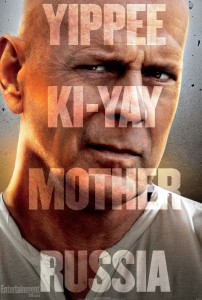We like Sleeper Agent John McClane. He is sympathetic to our cause. Sleeper Agent McClain destroys everything around him and is therefore a worthy addition to the Cyberman collective.
In previous communications, Secret Weapon McClane has brought down a large building, an airplane, a metropolitan city, and the entire Internet with his embedded programming. He is placed without his full understanding into situations of great danger, is mobilized by one of his handlers with either a code word or synaptic-engagement signal, and then becomes a ceaseless berserker immune to bullets, knives, broken glass, fire, and sarcasm.
In the latest communication, A Good Day To Die Hard, Soul Reaper McClane is informed that the agent called “Son” has been detained in Russia. It falls upon him to retrieve this Son-weapon for the good of the collective. McClane is delivered to the transport by Agent Daughter who triggers his superhuman killing abilities with the code phrase, “Please don’t make things worse.” We find this code phrase, a clever reverse-psychological cryptogram, to be quite amusing. We laugh in unison.
 Ha. Ha. Ha. Ha. Ha. Ha. Ha. Kill. Ha. Ha.
Ha. Ha. Ha. Ha. Ha. Ha. Ha. Kill. Ha. Ha.
In Russia, Angel Of Death McClane finds out that Agent Son is not detained and is, in fact like Agent Father, a nuclear-powered mortality machine. From this moment onward, the communication is about fire, weaponry, gravity defiance, and ingenious subterfuge the earth humans call “in-jokes,” which are amusing because, unlike the human out-jokes, the in-jokes are not actually humorous. Nations and infrastructure crumble, the Ceasing Units emerge triumphant, the human race is rendered helpless and prone to our decanting of their brains into perfect Cybermen armoury. It was a highly sentimental moment in cinema. Leftennant Leftennant even shed a tear at such a happy ending, which I found pleasing and equally disturbing and I shot him on sight.
These Die Hard communications have grown better and better with each transmission. The first film remains the most objectionable for McClain is disappointingly the most human in it, with flaws and frailties. He was the most similar to the human audience in it and, in this sense, engendered much loathing on our part. The second film found him again in peril on Christ’s Mass, and at first we assumed this was an unfortunate coincidence. Once the carnage of Spine-Taker McClain was unveiled however, we knew this “holiday” must be an inherent trigger within his programming, and he would be victorious against our third-tier Cyberman enemy, Saint Klaus Von Nick. With this revelation firmly encoded and triple-backed-up in our processors we could fully appreciate the totality of McClain, the God of Mutilation.
And with each communication, McClain has become more and more like a Cyberman, culminating with A Good Day To Die Hard when he finally accepts his role in the war for universal conquest. With the first gunshot, Bloodletting McClain is freed from the shackles of human moralism and wreaks havoc upon the deserving human race. We feel that replacing the “relatable, human McClain” with this new version is an improvement. Only a weak, quivering mass of emotion-powered viscera could feel otherwise.
We await eagerly the next communication from Die Hard. If we still breathed human breath, consider ours collectively baited, and let us hope this Osiris, this Hades, this Azrael that is John McClain continues his evolution from puny mortal to superheroic, unquenchable slayer for whom backstory, character arc, and a concern for consequences no longer apply. Hail! Hail!
Ha. Ha. Ha. Ha. Ha. Ha. Ha. Kill. Ha. Ha.








Comments